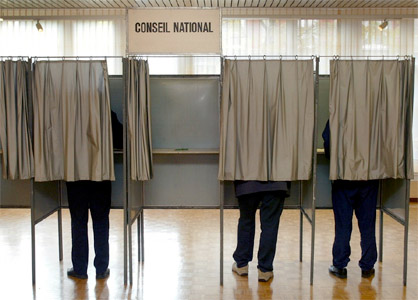How parliamentary elections work

The most important political event in four years will take place on October 23 when the Swiss elect a new federal parliament.
How do citizens vote in a country often held up as a model democracy?
The Swiss parliament is a bicameral legislature composed of a House of Representatives and a Senate. The House is the larger chamber and represents the population, while the Senate represents the cantons.
Elections to the House are held every four years on the penultimate Sunday in October. Senators may be elected on a different election cycle, determined by their canton. All cantons except Zug and Appenzell Inner Rhodes hold their senate elections on federal election day.
Parliament makes federal laws, oversees the federal administration, and elects the seven members of the cabinet – the Swiss government – as well as the members of the federal judiciary.
Unlike in the United States though, there is no equivalent of the impeachment procedure allowing for the removal of members of the executive branch or the judiciary.
Each canton votes
On October 23 Swiss voters will elect all 200 members of the House and 44 of the 46 members of the Senate.
There is no national ballot. Strictly speaking, the federal election consists of 26 cantonal elections held on the same day. Voters are only allowed to vote for candidates in the canton where they are officially registered. Candidates run in one canton only.
All Swiss citizens 18 years and older are automatically entitled to vote and to stand for office.
There is no registration process for citizens living within the country. As Swiss are obliged by law to officially register in the commune where they live, the commune has the necessary information for sending out voting materials.
Swiss citizens living abroad have had the right to vote and to run for national office since 1977. They register either in their last place of residence or in their commune of origin. This year, more than 130,000 Swiss abroad are registered to vote. Several among them are running for national office.
Proportionality
The principle of proportionality is applied to federal elections. Unlike majority or “winner takes all” systems, proportionality allots mandates in a given district according to the share of votes each party receives. This is considered the fairest possible distribution of seats.
Each canton constitutes a voting district. Candidates do not run individually, but on lists, usually put together by political parties. Some parties run gender-specific lists or lists based on regional criteria.
Voters have a variety of choices. They can vote for a list, for individual candidates only, or a combination of the two.
But the outcome of the election depends on party strength, measured in votes received. This determines how the available seats are divided up. The candidates with the most votes on each list are awarded available seats.
“In many foreign proportionality systems, a voter is at best able to give a preference vote for one candidate and a vote for a party,” says Hans Urs Wili, head of the political rights division in the Federal Chancellery.
Wili, who is about to direct his ninth federal election, says that the Swiss system is more sophisticated.
“Depending on the size of the canton, a voter can further differentiate his vote, for instance giving four-fifths of it to one party and the remaining fifth to another one.”
Seat distribution in the House
The 200 seats of the House are distributed among the cantons according to the size of the population, with each canton having at least one seat. The general rule is one seat for each 36, 000 inhabitants. Accordingly, canton Zurich has 34 representatives, while canton Uri has only one.
The distribution of seats changes every ten years, based on census results. This year there are no changes because there has not been a new census.
A disadvantage of the Swiss system is that proportionality rules lose their relevance in smaller cantons, owing to the small number of seats available. Smaller parties are only able to get elected in larger cantons, where they can enhance their prospects by pooling lists.
“Large parties enjoy an advantage as long as the smaller ones aren’t able to make themselves big enough by pooling lists,” says Wili.
Elections to the Senate
Size does not matter in the Senate, where each canton has the same number of seats, regardless of population. Switzerland’s 20 full cantons have two senators each, while its six half-cantons have one each.
With the exception of canton Jura, senators are elected according to the majority rule. This means the candidates with the highest number of votes win.
Smaller parties have even less of a chance of being elected to the Senate than to the House.
In 2007, only members of the four parties that form the national government are represented in the Senate: Christian Democrats, Radicals, Social Democrats and Swiss People’s Party members.
Four years on, a total of seven parties are represented in the chamber, including the Greens, the Liberal Greens and the Conservative Democratic Party.
swissinfo, Christian Raaflaub
Swiss living abroad can register either in their last place of residence in Switzerland or in their commune of origin.
135,000 of the approximately 700,000 Swiss abroad have registered to vote.
In canton Uri the Swiss abroad constitute 1% of the voters, in canton Geneva 6%. The national average is 2.2% per canton.
Swiss abroad also have the right to run for office. Until now, none have managed to get elected to parliament.
Voting system House of Representatives: proportional
Number of Representatives: 200
Voting system Senate: majority
Number of Senators: 46
(Adapted from German by Urs Geiser)

In compliance with the JTI standards
More: SWI swissinfo.ch certified by the Journalism Trust Initiative









You can find an overview of ongoing debates with our journalists here . Please join us!
If you want to start a conversation about a topic raised in this article or want to report factual errors, email us at english@swissinfo.ch.